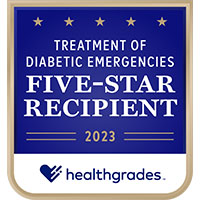All Emergency Room Services
Emergency Room Locations
Whether it’s a broken bone, high fever or a more severe medical emergency like a heart attack, we are ready to pro...
When to Go to an ER
Find out what constitutes a medical emergency and when you should visit an emergency room or ER.
Hospital & ER Safety
Come to our hospital knowing that we do everything possible to keep patients and staff safe.
Emergency Healthy Living
Saint Vincent Hospital provides helpful emergency health articles and tips to keep you in the know on trending topics, c...
Exception occurred while executing the controller. Check error logs for details.
Getting Your Meds Right: Medication Reconciliation
Medication reconciliation is the process of comparing a patient's medication orders to all of the medications that the patient has been taking. For example, if you check into a hospital, the reconciliation is done to avoid medication errors such as omissions, duplications, dosing errors or drug interactions.
As a patient or patient representative, you have many steps you can take to protect yourself if you have a medical emergency and need to have your medications considered into your medical plan. Similarly, responsible hospitals are taking very serious measures to avoid potential medication errors as well.
For a newly hospitalized patient:
As a patient or patient representative, you have many steps you can take to protect yourself if you have a medical emergency and need to have your medications considered into your medical plan. Similarly, responsible hospitals are taking very serious measures to avoid potential medication errors as well.
What Can You Do To Avoid Medication Errors?
Most people believe their medications are archived in their “file.” While your medication information is documented by your doctor’s office, time is of the essence in a medical emergency. Four steps to take:- Keep detailed records of your medications and make sure your spouse or a trusted friend has access. These people should be your emergency contacts.
- Let your emergency contacts know how to reach your physician.
- Provide a written list to the hospital staff, who will put the information in your file in your hospital room. A comprehensive list of medications should include all prescription medications: herbals, vitamins, nutritional supplements, over-the-counter drugs, vaccines, diagnostic and contrast agents, radioactive medications, parenteral nutrition, blood derivatives and intravenous solutions.
- Know that it’s okay to question everything and do your own research. It’s your health!
What Are Hospitals Doing To Avoid Medication Errors?
According to government data, more than 40 percent of medication errors are believed to result from inadequate reconciliation during admission, transfer and discharge of patients. Many of these errors can be averted with medication reconciliation processes. Here’s how it works:For a newly hospitalized patient:
- Obtaining and verifying the patient’s medication history
- Documenting the patient’s medication history
- Writing orders for the hospital medication regimen
- Creating a medication administration record
- Post discharge medication regimen
- Developing discharge instructions for the patient for home medications
- Educating the patient
- Transmitting the medication list to the follow-up physician
- Documenting a complete list of the current medications
- Updating the list whenever medications are added or changed

 The Emergency Room (ER) at Saint Vincent Hospital provides you with access to nationally renowned experts in emergency medicine, toxicology, cardiac problems, trauma, and more when you need them most. At the Saint Vincent Hospital Emergency Room, you’ll find:
The Emergency Room (ER) at Saint Vincent Hospital provides you with access to nationally renowned experts in emergency medicine, toxicology, cardiac problems, trauma, and more when you need them most. At the Saint Vincent Hospital Emergency Room, you’ll find: